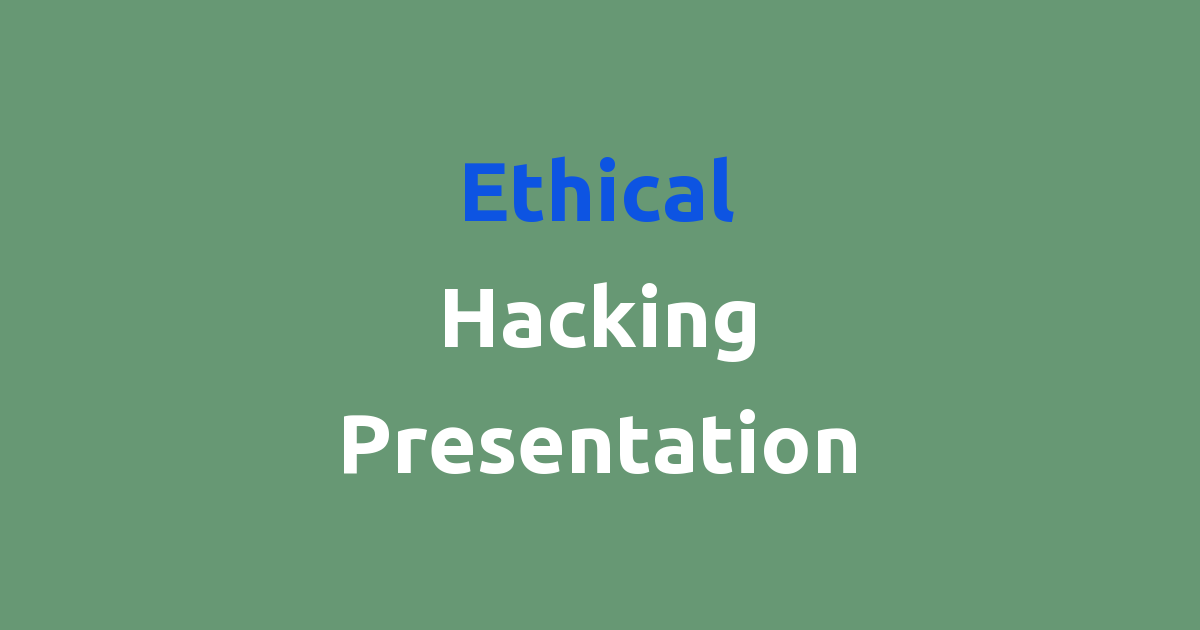Presentation on ethical hacking.
Introduction
As the world becomes more reliant on technology, the need for cybersecurity becomes more important than ever. Ethical hacking is a crucial aspect of ensuring the security of computer systems and networks. This presentation will delve into the topic of ethical hacking, exploring its importance, benefits, and ethical considerations.
Problem Statement
With the increasing number of cyber-attacks and data breaches, it is evident that traditional security measures are no longer sufficient. Many organizations struggle to keep up with the ever-evolving tactics of hackers. There is a need for a proactive approach to cybersecurity that involves ethical hacking to identify vulnerabilities before they are exploited by malicious actors.
Existing System
The existing system for cybersecurity typically relies on defensive measures such as firewalls, antivirus software, and intrusion detection systems. While these measures are important, they are reactive in nature and may not be effective against sophisticated cyber threats. This reactive approach leaves organizations vulnerable to attacks and data breaches.
Disadvantages
The main disadvantage of relying solely on defensive measures is that they can be easily bypassed by skilled hackers. Additionally, these measures may only provide a false sense of security, leading organizations to overlook potential vulnerabilities. Without proactive measures in place, organizations are at risk of falling victim to cyber-attacks.
Proposed System
The proposed system involves implementing ethical hacking as a proactive approach to cybersecurity. By employing ethical hackers to simulate attacks on their own systems, organizations can identify and patch vulnerabilities before they can be exploited by malicious hackers. This proactive approach helps organizations stay one step ahead of cyber threats and strengthens their overall security posture.
Advantages
There are several advantages to implementing ethical hacking as part of a cybersecurity strategy. Firstly, ethical hacking helps organizations identify weaknesses in their systems that may have otherwise gone unnoticed. By proactively identifying and addressing vulnerabilities, organizations can reduce the risk of data breaches and other cyber-attacks.
Secondly, ethical hacking can help organizations comply with regulations and industry standards related to cybersecurity. Many regulatory bodies require organizations to conduct regular security assessments, and ethical hacking provides a robust method for meeting these requirements.
Finally, ethical hacking can help organizations build trust with their customers and stakeholders. By demonstrating a commitment to cybersecurity through ethical hacking practices, organizations can instill confidence in their ability to protect sensitive data and information.
Features
The key features of ethical hacking include vulnerability assessment, penetration testing, and social engineering. Vulnerability assessment involves identifying weaknesses in systems, networks, and applications that could be exploited by hackers. Penetration testing involves simulating real-world cyber-attacks to test the effectiveness of existing security measures. Social engineering involves manipulating users into divulging sensitive information.
Ethical hackers use a variety of tools and techniques to conduct their assessments, including network scanners, password crackers, and vulnerability scanners. They must adhere to strict ethical guidelines and legal requirements to ensure that their activities are conducted responsibly and lawfully.
Conclusion
In conclusion, ethical hacking is a critical component of a comprehensive cybersecurity strategy. By proactively identifying and patching vulnerabilities, organizations can reduce the risk of data breaches and other cyber-attacks. Ethical hacking helps organizations stay one step ahead of cyber threats and demonstrates a commitment to protecting sensitive data and information. Implementing ethical hacking as part of a cybersecurity strategy can help organizations build trust with their customers and stakeholders and comply with regulatory requirements. As technology continues to advance and cyber threats become more sophisticated, ethical hacking will play an essential role in ensuring the security of computer systems and networks.

